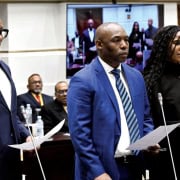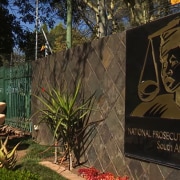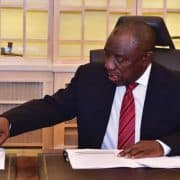|
Getting your Trinity Audio player ready...
|
• Public Service and Administration minister Senzo Mchunu signing the anti-corruption pledge at Unisa during the recent International Anti-Corruption Day activities. Photo: @UNinSouthAfrica.
By Thato Mahlangu
During the recent International Anti-Corruption Day activities, held on 9 December at the University of South Africa (Unisa), heads of law enforcement and anti-corruption organisations vowed to continue to work in fast-tracking the arrests of corrupt individuals in both the private and public sector as well as in business.
Head of the Special Investigating Unit (SIU), Advocate Andy Mothibi, said fighting corruption, which undermines the rule of law and sustainable development in communities, requires a concerted effort from both the public and private sectors.
“We also require strong and sustainable state institutions such as those that have the privilege to serve, and we have to have implemented effective consequence management to hold those responsible to account,” Mothibi said, adding that failure to punish those responsible would lead to a culture of impunity and increased corruption.
The role of affected partners in fighting corruption
National director of public prosecutions, Advocate Shamilla Batohi, said at the Unisa event that it is the efforts of civil society organisations and state institutions like the National Prosecuting Authority (NPA) that help the wheels of justice to turn.
“We must thank civil society and the media in trying holding the government accountable in recent times. Civil society played a huge role in raising important issues,” she said.
Batohi added that the strength of key state institutions like the NPA, SIU, the police, and Parliament will determine how corruption is dealt with by law enforcement.
“We want to see people being held accountable. People should know that there is a proper investigation, a proper prosecution and there will be a penalty. There should be some deterrence [from doing corrupt activities),” she said.
“People want to see action. The Zondo Commission is there every day demonstrating how institutions have failed people of South Africa. People want to know why there haven’t been any arrests.”
Much has been achieved, but the work is not over
Corruption Watch executive director David Lewis reflected on the efforts that have been made in the new administration.
He said it is important to highlight what has been achieved in the last two years.
“Two cabinet ministers have been arrested, we have the special unit set up in the NPA and other important developments we have had in the last two years,” he said.
But Lewis said there was still an enormous amount of work that needs to be done by the public, government, civil society organisations, and the media.
“There has been a lot of damage done especially during the State Capture Project, which needs to be undone.”
Inaction against corruption will suffocate SA
The late struggle icon Nelson Mandela, during the parliamentary debate on the state of the nation address on 24 February 1995, warned that inaction against corruption will continue to cripple the country. If rooting out corruption is not treated with urgency, corruption will continue to suffocate South Africa’s potential to grow.
Almost 25 years later others would agree that corruption seems to have remained with us as fewer people have taken it upon themselves to fight the scourge.
Mandela said if there are no measures taken that would make people stop engaging in corrupt activities, corruption will persist.
“If the sanctions against corrupt practices are not carried out in every corner with equal fervour – government and civil service, political parties, private business, and non-governmental organisations – this scourge will remain with us,” he said.








